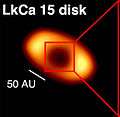LkCa 15 b
| Exoplanet | List of exoplanets | |
|---|---|---|
| Parent star | ||
| Star | LkCa 15 | |
| Constellation | Taurus-Auriga Star Formation Region | |
| Right ascension | (α) | 4h 39m 18.0s |
| Declination | (δ) | +22° 21′ 03″ |
| Apparent magnitude | (mV) | 11.91 |
| Spectral type | K5V | |
| Orbital elements | ||
| Semi-major axis | (a) | 15.7±2.1[1] AU |
| Discovery information | ||
| Discovery date | 2011 | |
| Discoverer(s) | Kraus and Ireland[1] | |
| Discovery method | Direct imaging | |
| Discovery site | Keck II | |
| Discovery status | ||
LkCa 15 b is a candidate protoplanetary object in orbit around LkCa 15, a star in the Taurus-Auriga Star Forming Region. It was discovered by direct imaging techniques using the Keck II telescope in 2011 by Adam Kraus and Michael Ireland.[1] A 2015 study of observations from the Magellan Telescopes and the Large Binocular Telescope argued that the planet is forming though accretion.[2] It is the first observed exoplanet seen in the process of active accretion.[3]
-

LkCa 15 protoplanetary Disk
References
- 1 2 3 Kraus, Adam L.; Ireland, Michael J. (2011). "LkCa 15: A Young Exoplanet Caught at Formation?". The Astrophysical Journal 745 (1). arXiv:1110.3808. doi:10.1088/0004-637X/745/1/5.
- ↑ Sallum, S.; Follette, K. B.; Eisner, J. A.; Close, L. M.; Hinz, P.; Kratter, K.; Males, J.; Skemer, A.; Macintosh, B.; Tuthill, P.; Bailey, V.; Defrère, D.; Morzinski, K.; Rodigas, T.; Spalding, E.; Vaz, A.; Weinberger, A. J. (2015). "Accreting protoplanets in the LkCa 15 transition disk". Nature 527 (7578): 342–344. doi:10.1038/nature15761. ISSN 0028-0836.
- ↑ Irene Klotz (18 November 2015). "Astronomers see planet still growing in its stellar womb". Reuters (News Daily).
External links
- LkCa 15 b listing at the Exoplanet.eu, the Extrasolar Planet Encyclopedia
This article is issued from Wikipedia - version of the Monday, December 14, 2015. The text is available under the Creative Commons Attribution/Share Alike but additional terms may apply for the media files.